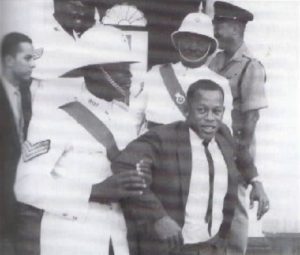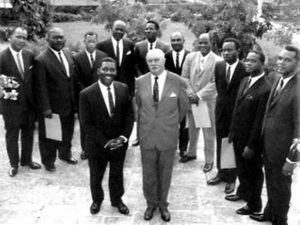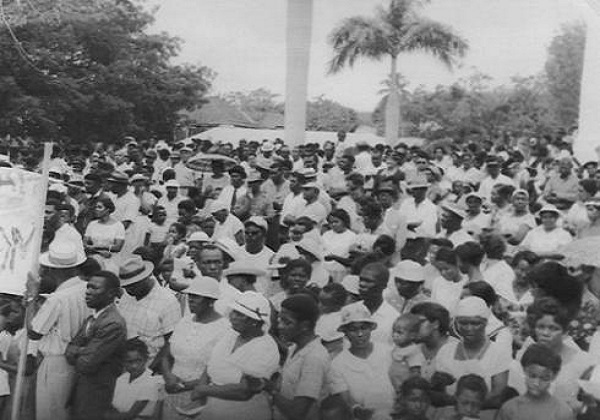#TheBahamas – January 9, 2019 – This singular event in Bahamian history played a significant role in shaping the modern Bahamas we experience today. The significant events leading up and emanating from  Majority Rule must become permanently etched in the Bahamian historical landscape as these events define us as a people, reveal what we believe in as Bahamians, and serve as a constant reminder of our vision and values.
Majority Rule must become permanently etched in the Bahamian historical landscape as these events define us as a people, reveal what we believe in as Bahamians, and serve as a constant reminder of our vision and values.
Following is a cursory account of the significant events surrounding and leading up to Majority Rule, the meaning of Majority Rule, and homage will be duly paid to the freedom fighters that fought this epic battle in the name of freedom and justice.
The Burma Road Riots
Many local political historians believe that June 1, 1942 marked the beginning of the modern political history of the Bahamas. The events of the Burma Road Riots came as a result of the agitation by labourers for equal pay for equal work, regardless of colour or nationality.
As you know, a satellite airfield was being constructed in western New Providence for use by the American armed forces. A labour dispute ensued over equal pay and this dispute took on a life of its own and became intimately interwoven with the overall movement for freedom and social justice. Today that site is the Lynden Pindling International Airport.
So it is clear that from the first stirrings of political activity in the country, labour has been an integral part of the struggle.
The Suffrage Movement in The Bahamas
The Movement really started with a conversation between Mrs. Mary Ingraham and her husband following his defeat in the 1949 general elections. The defeated candidate opined that his political fortunes could have been very different had women voted in that election. Other significant national events that fueled the Suffrage Movement were the Burma Road Riots of 1942, the General Strike of 1958, and the Labour Movement of the 1950s. The civil rights movement in the United States with Dr. Martin Luther King was an international event that also fanned the flames that burned for social justice and equality in The Bahamas.
Mary Ingraham formed alliances with kindred spirits from across the political divide as Bahamian women and men worked tirelessly together to fight racial, political and economic injustice in The Bahamas. This alliance included freedom fighters such as Georgiana Symonette, Eugenia Lockhart, Althea Mortimer, Albertha M. Isaacs, Doris Johnson, Grace Wilson, Mildred Moxey, Ethel Kemp, Gladys Bailey, Una Prosper Heastie, Veronica Lotmore, Nora Hannah and Madge Brown.
Mary Ingraham was elected as President of the Suffrage Movement in 1957. Georgiana Symonette was the Vice-president and Eugenia Lockhart was the Treasurer. In 1958, Dr. Doris Johnson returned home from studying abroad and joined the Suffrage Movement.
During the years 1959 and 1960, the Movement gained considerable ground advancing petitions and demonstrating publicly for the right to vote. In November 1960, Eugenia Lockhart and Dr. Doris Johnson accompanied Henry M. Taylor, Chairman of the PLP, to London to present a Petition to the Secretary of State for the Colonies. In January 1961 a Select Committee of the House of Assembly gave a Report in favour of the right to vote for women but with effect from January 1963. The PLP and the Independents in the House of Assembly opposed the report. An appeal was made to the House of Commons in England again. On February 23, 1961 a Bill to enable women to vote was enacted with effect from June 30, 1962. Bahamian women voted for the first time on November 26, 1962.
The birth of the PLP
The PLP was born out of a movement that embodied the hopes, aspirations, and feelings of a generation of Bahamians who were demanding equal work, majority rule, and freedom to pursue any hopes and wishes they dared conceive. The man who generally credited with conceiving the Progressive Liberal Party was William Cartwright, a publisher, real estate broker, and Member of the House of Assembly for Cat Island. In August of 1953, Mr. Cartwright reportedly invited to the first meeting on Bay and Frederick Streets, the following men: The Hon. Charles Rodriquez, Mr. Henry Milton Taylor, Mr. Cyril Saint John Stevenson, Mr. Samuel Carey, Mr. Holly Brown, Mr. Clement Pinder, Mr. F.W. Russell and others.
Many black businessmen and lawyers were invited to join, but for reasons of their own, decided not to be identified with the new movement. But the party’s course was clear from the beginning; the PLP was designed to represent all that was opposed to unfair privilege and the wealth and power this afforded the Bay Street Boys.
General Strike of 1958
 In support of 1957’s protests, a 16-day General Strike brought Nassau to a screeching halt. Unionized or not, just about every worker participated, and the strike was quite peaceful. The result was the Trade Union and Industrial Conciliation Act and the setting up of a Labor Department. The General Strike took place in January 1958.
In support of 1957’s protests, a 16-day General Strike brought Nassau to a screeching halt. Unionized or not, just about every worker participated, and the strike was quite peaceful. The result was the Trade Union and Industrial Conciliation Act and the setting up of a Labor Department. The General Strike took place in January 1958.
Later that year in June, Allan Lennox Boyd, Secretary of State for the Colonies ordered that the first constitutional steps be taken toward Majority Rule. The voting franchise was extended to all males whether they were land owners or not; the once ubiquitous unlimited plural vote was ordered to be reduced to two and the abolition of the company vote was ordered.
Women’s Right to Vote
In November of 1960 Sir Henry Taylor led a delegation to London to champion the right of women to vote in The Bahamas. Accompanying Sir Henry were notables like Dame Doris Johnson and Eugenia Lockhart. Shortly after their return, women received their right to vote and exercised those rights during the November 26, 1962 general elections.
This new women’s right brought a force and element into the history of The Bahamas that affected the country’s social, economic and political development. To this day, the effect of women exercising their right to vote has impacted all aspects of national life as women from all sides of the political divide have, and continue to make their contribution to the country, holding key positions in many offices throughout our country.
Black Tuesday
On this day, the governing United Bahamian Party sought the approval for a Boundaries Draft Order, which established the boundaries for the various constituencies of New Providence and the Family Islands, under the provisions of the 1964 Constitution. During a sitting of the House of Assembly, the PLP proposed two amendments to the revision of the Boundaries Draft Order which the UBP had presented. The amendments were designed to get a fairer idea of the number of voters and their distribution, but both proposed amendments were rejected.
It was at that point that Sir Lynden walked over to the Speakers’ table and lifted the 165-year-old mace, the symbol of the Speaker’s authority, and said, “This is the symbol of authority, and authority on this island belongs to the people and the people are outside.”
With that he raised the mace and hurled it through the open window of the House of Assembly.
The Progressive Liberal Party describes this event as “an act of deviance in the pursuit of liberty and fairness.” So Tuesday 27, April 1965 was destined to go down in Bahamian history as Black Tuesday.
Majority Rule Day
Some have argued that the great significance of Majority Rule was that after years of struggle by many freedom and justice loving people, the back of the old oligarchy was finally broken. More importantly, Majority Rule presented the opportunity for real democracy to come to the Bahamas, underpinned by equality, tolerance, economic justice, social justice, all important elements in the creation of a free, modern, democratic state.
All Bahamians benefited, in one way or another, from the historic event that took place on January 10, 1967, a day that now wears the rather inelegant appellation of Majority Rule Day.
Majority Rule ushered in the opportunity for all Bahamians to have constitutional, political, social, cultural and economic rights. Where these rights were not readily accessible, the Government of the day created laws and implemented policies to enable these entitlements.
January 10th is a day in the national calendar that belongs to all Bahamians – not just PLP’s but to all Bahamians, black and white, rich and poor, young and old, city dweller and Family Islander, and, yes, PLP and FNM alike. January 10th needs to be commemorated and celebrated by all of us because it represents one of the truly great and defining moments in our evolution as a people.
With the exception of Emancipation from Slavery in 1834 and the attainment of Independence in 1973, there is no event of more consequence and historical importance than the attainment of Majority Rule on January 10th, 1967. January 10th, 1967 represents the transition from the old Bahamas to a New Bahamas; the point of transition from minority government to Majority Rule; the point of transition to a modern democracy.
It also represents, however, one of the highest pinnacles in the historic – and still ongoing – struggle of the Bahamian people for economic empowerment, for equality of opportunity, and for social justice.
January 10th, 1967, to be sure, was neither an end nor even a beginning. Instead, it was an important milestone in a journey that was begun centuries ago when some anonymous slave struck a blow for freedom for the first time. We pause to pay homage to the personalities and players in this epic struggle. In a hard fought and competitive election in 1967, the PLP delivered the following 18 members to a 38-member House of Assembly. They were: Lynden Pindling, Preston Albury, Clarence Bain, Milo Butler, Clifford Darling, Elwood Donaldson, Arthur Foulkes, Carlton Francis, Arthur Hanna, Warren Levarity, Curtis MacMillan, Uriah McPhee, Maurice Moore, Edmund Moxey, Jimmy Shepherd, George Thompson, Jeffrey Thompson and Cecil Wallace Whitfield. Randol Fawkes who successfully ran as Labour in 1962 and 1967 with the support of the PLP threw his support behind the PLP and became a member of the first Majority Rule cabinet. He figured prominently in the movement toward Majority Rule.
 Successful Independent candidate Sir Alvin Braynen threw in his lot with the PLP and accepted the post of Speaker of the House. These two warriors for justice and freedom tipped the proverbial scale in favor of the PLP and the first Majority Rule cabinet was formed:
Successful Independent candidate Sir Alvin Braynen threw in his lot with the PLP and accepted the post of Speaker of the House. These two warriors for justice and freedom tipped the proverbial scale in favor of the PLP and the first Majority Rule cabinet was formed:
This distinguished group consisted of Cecil Wallace-Whitfield, Milo Butler, Arthur Hanna, Clarence Bain, Jeffrey Thompson, Carlton Francis, Randol Fawkes, Warren Levarity, Curtis McMillan, Clement T. Maynard and Lynden Pindling.
In this 40th year of nationhood, we come together as one people to mark a critically important milestone in our progress as a people – and to re-commit ourselves to a struggle that never ends.
As The Bahamas looks to the future, it must be that the average man, making the average salary, with children to educate to university level; that they see not a glass ceiling but opportunities that give rise to hope as we work to build the best little country in the world.
Taken From: Bahamas Ministry of Tourism
(https://www.bahamas.com/event/majority-rule-day-holiday)


 News1 week ago
News1 week ago
 Bahamas News6 days ago
Bahamas News6 days ago
 Bahamas News4 days ago
Bahamas News4 days ago
 Caribbean News1 week ago
Caribbean News1 week ago
 News1 week ago
News1 week ago
 Health4 days ago
Health4 days ago
 News1 week ago
News1 week ago














